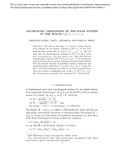Asymptotic greediness of the Haar system in the spaces Lp[0 , 1] , 1< p< ∞
Fecha
2019Versión
Acceso abierto / Sarbide irekia
Tipo
Artículo / Artikulua
Versión
Versión aceptada / Onetsi den bertsioa
Identificador del proyecto
Impacto
|
|
10.1007/s00365-019-09466-1
Resumen
Our aim in this paper is to attain a sharp asymptotic estimate for the greedy constant Cg[H(p), Lp] of the (normalized) Haar system H(p) in Lp[0 , 1] for 1 < p < ∞. We will show that the super-democracy constant of H(p) in Lp[0 , 1] grows as p∗= max { p, p/ (p- 1) } as p∗ goes to ∞. Thus, since the unconditionality constant of H(p) in Lp[0 , 1] is p∗- 1 , the well-known general estimates for the ...
[++]
Our aim in this paper is to attain a sharp asymptotic estimate for the greedy constant Cg[H(p), Lp] of the (normalized) Haar system H(p) in Lp[0 , 1] for 1 < p < ∞. We will show that the super-democracy constant of H(p) in Lp[0 , 1] grows as p∗= max { p, p/ (p- 1) } as p∗ goes to ∞. Thus, since the unconditionality constant of H(p) in Lp[0 , 1] is p∗- 1 , the well-known general estimates for the greedy constant of a greedy basis obtained from the intrinsic features of greediness (namely, democracy and unconditionality) yield that p∗≲Cg[H(p),Lp]≲(p∗)2. Going further, we develop techniques that allow us to close the gap between those two bounds, establishing that, in fact, Cg[H(p), Lp] ≈ p∗. Our work answers a question that was raised by Hytonen (2015). [--]
Materias
Haar basis,
Greedy basis,
Unconditional basis,
Democratic basis,
Lp spaces,
Lebesgue-type inequalities
Editor
Springer
Publicado en
Constructive Approximation, 2019
Departamento
Universidad Pública de Navarra. Departamento de Estadística, Informática y Matemáticas /
Nafarroako Unibertsitate Publikoa. Estatistika, Informatika eta Matematika Saila /
Universidad Pública de Navarra/Nafarroako Unibertsitate Publikoa. Institute for Advanced Materials and Mathematics - INAMAT2
Versión del editor
Entidades Financiadoras
F. Albiac and J. L. Ansorena acknowledge the support of the grant MTM2014-53009-P (MINECO, Spain). F. Albiac was also supported by the grant MTM2016-76808-P (MINECO, Spain). P. M. Bern a was supported by a Ph.D. fellowship from the program FPI-UAM, as well as the grants MTM-2016-76566-P (MINECO, Spain) and 19368/PI/14 (Fundación Séneca, Región de Murcia, Spain).






